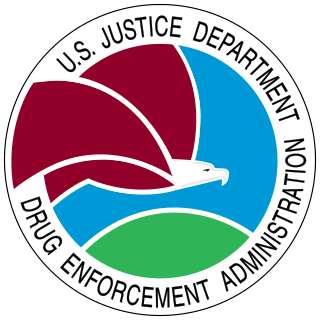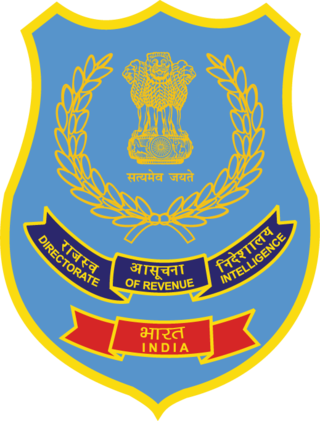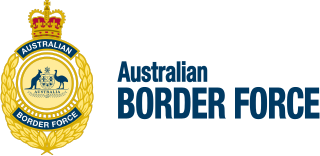
Antigua and Barbuda is a sovereign archipelagic country composed of Antigua, Barbuda, and numerous other small islands. Antigua and Barbuda has a total area of 440 km2, making it one of the smallest countries in the Caribbean. The country is mostly flat, with the highest points on Antigua being in the Shekerley Mountains and on Barbuda the Highlands. The country has a tropical savanna climate, with pockets of tropical monsoon in Antigua's southwest. Its largest city is St. John's.

The Drug Enforcement Administration (DEA) is a United States federal law enforcement agency under the U.S. Department of Justice tasked with combating illicit drug trafficking and distribution within the U.S. It is the lead agency for domestic enforcement of the Controlled Substances Act, sharing concurrent jurisdiction with the Federal Bureau of Investigation and U.S. Customs and Border Protection. The DEA is responsible for coordinating and pursuing U.S. drug investigations both domestically and internationally.

The High Intensity Drug Trafficking Area (HIDTA) program is a drug-prohibition enforcement program run by the United States Office of National Drug Control Policy. It was established in 1990 after the Anti-Drug Abuse Act of 1988 was passed. The HIDTA program was made permanent through Title III of the Office of National Drug Control Policy Reauthorization Act of 2006.

The Hong Kong Customs and Excise Department is the customs service of the Hong Kong Special Administrative Region. The agency was established to protect Hong Kong from smuggling, ensure the collection of duties on taxable goods, detect and prevent drug trafficking and abuse, safeguard intellectual property rights, protect consumer interests, facilitate legitimate business and uphold Hong Kong's trade reputation, regulate money service operators and dealers in precious metals and stones, and combat money laundering and terrorist financing.

In Singapore, law enforcement is principally led by the Singapore Police Force (SPF), and supported by other agencies including the Singapore Prison Service, Central Narcotics Bureau, Corrupt Practices Investigation Bureau, Internal Security Department, Immigration and Checkpoints Authority, and Singapore Customs. Furthermore, some law enforcement powers may be exercised by non-government entities such as auxiliary police forces and security officers.

The monarchy of Antigua and Barbuda is a system of government in which a hereditary monarch is the sovereign and head of state of Antigua and Barbuda. The current Antiguan and Barbudan monarch and head of state, since 8 September 2022, is King Charles III. As sovereign, he is the personal embodiment of the Crown of Antigua and Barbuda. Although the person of the sovereign is equally shared with 14 other independent countries within the Commonwealth of Nations, each country's monarchy is separate and legally distinct. As a result, the current monarch is officially titled King of Antigua and Barbuda and, in this capacity, he and other members of the Royal Family undertake public and private functions domestically and abroad as representatives of Antigua and Barbuda. However, the King is the only member of the Royal Family with any constitutional role.

The Egmont Group of Financial Intelligence Units is an international organization that facilitates cooperation and intelligence sharing between national financial intelligence units (FIUs) to investigate and prevent money laundering and terrorist financing. National FIUs collect information on suspicious or unusual financial activity and are responsible for processing and analyzing the information received. FIUs are normally not law enforcement agencies themselves, findings are shared with appropriate law enforcement or prosecution bodies if sufficient evidence of unlawful activity is found. The Egmont Group is headquartered in Ottawa, Ontario, Canada.

The Regional Security System (RSS) is an international agreement for the defence and security of the eastern Caribbean region with future expansion planned with South America.

The Directorate of Revenue Intelligence (DRI) is the apex anti-smuggling intelligence, investigations and operations agency in India.

The Treasury of the Isle of Man is the finance department of the Isle of Man Government. It prepares the annual budget for the Government, and also handles taxation, customs and excise, economic affairs, information systems, internal audit, currency and the census in the Isle of Man.

The following outline is provided as an overview of and introduction to Antigua and Barbuda:

The Royal Police Force of Antigua and Barbuda is the law enforcement agency for Antigua and Barbuda. The Commissioner in 2017 was Atlee Rodney. The force has 350 officers.

Border Force (BF) is a British law enforcement command within the Home Office, responsible for frontline border control operations at air, sea and rail ports in the United Kingdom. The force was part of the now defunct UK Border Agency from its establishment in 2008 until Home Secretary Theresa May demerged it in March 2012 after severe criticism of the senior management.

The Australian Border Force (ABF) is a federal law enforcement agency, part of the Department of Home Affairs, responsible for offshore and onshore border enforcement, investigations, compliance, detention operations and customs services in Australia. Through the ABF's Marine Unit, the ABF performs Coast Guard and marine law enforcement duties and is a component of the Maritime Border Command. The ABF is also part of the National Intelligence Community and is an active member of the World Customs Organization.
The National Security Council of Antigua and Barbuda was established in 2006 by The National Security Council Act of 2006. The council serves as the government's main forum for debating issues pertaining to national security, coordinating the policies and actions of the government's departments and agencies in this area, and carrying out any duties assigned to it by legislation. Establishing priorities among activities that address national security interests and requirements, ensuring the collection and collation of information and intelligence relating to Antigua and Barbuda's national security and the integration of that information and intelligence into the government's domestic, foreign, and security policies, and approving policies for departments and agencies of government to follow in relation to national security are all part of the Council's duties. The Council may also recommend to the Minister related to these policies.
The National Security Council Act of 2006 is an Act of the Parliament of Antigua and Barbuda.
The national security of Antigua and Barbuda is the collaboration of numerous institutions, including law enforcement, military, paramilitary, governmental, and intelligence agencies that seek to ensure Antigua and Barbuda's national security.

The Service and Support Unit (SSU) is a branch of the Antigua and Barbuda Defence Force. The unit is responsible for catering services, transportation, military construction, intelligence, and medical support to the rest of the force. The current goal of the unit is to upgrade its sections into platoons.
The Ministry of Tourism, Civil Aviation, Transportation and Investment is a Cabinet-level governmental agency in Antigua and Barbuda responsible for investment and the country's tourism industry.













